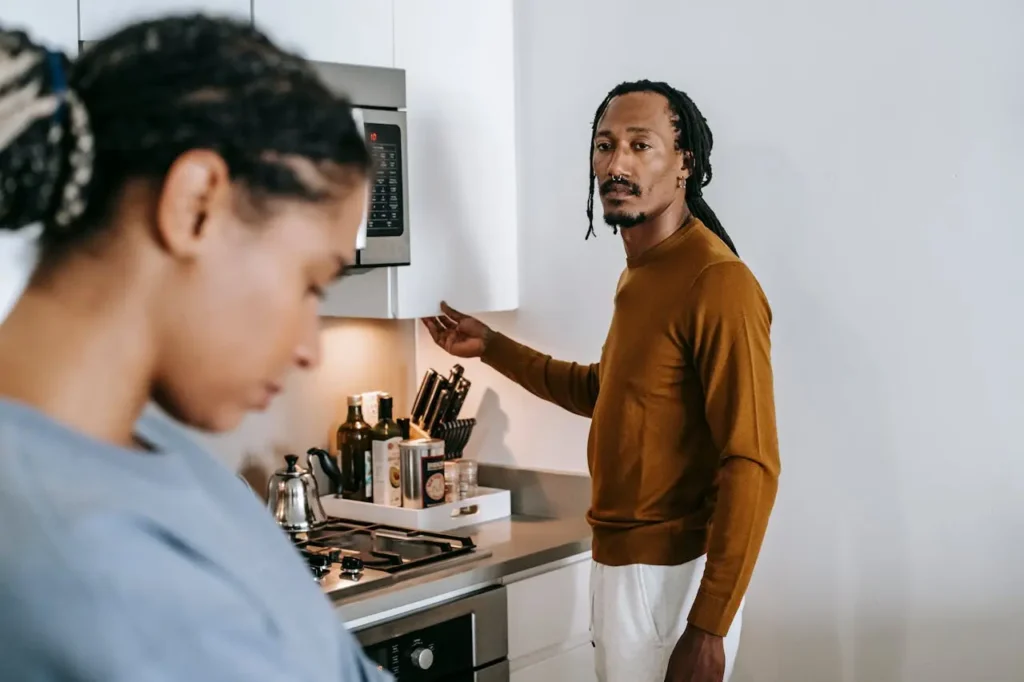We’ve all been there, right? That awful feeling you get when you mess up.
I was wrong sometimes, I’ll admit it. There were times I said “sorry” simply to get it over with; let me tell you—that doesn’t work.
Whether you’re talking to a friend, partner, or family member, it is good to possess that important skill of knowing how to apologize.
Then, what does work? Let’s break it down.
Table of Contents
How to Apologize Effectively in Relationships and Why It Matters
Apologizing is a vital part of maintaining healthy relationships because it shows that you take responsibility for your actions and care about making things right. It also shows that you are mature person, aware of your mistakes, and that you’re willing to grow as a person.
When you apologize with honesty, you’re not just saying sorry—you’re acknowledging that your behavior had an impact on your partner and that you’re willing to put in the effort to repair any damage done. Apologies can help clear the air, mend hurt feelings, and keep your relationship strong and connected. So, the next time you feel guilty about something you did, it’s important to recognize why offering a deep apology matters:
Rebuilding Trust
Trust is the foundation of any relationship. When you make a mistake, it can shake that foundation. A sincere apology is the first step in rebuilding trust. It shows the other person that you acknowledge your mistake and are committed to making things right.
For example: if you forgot your partner’s birthday, that could make them feel undervalued. An apology that acknowledges the oversight and expresses genuine regret can help repair the damage and show that you value the relationship.
Preventing Future Conflicts
A well-delivered apology not only addresses the current issue but also helps prevent similar problems in the future. By acknowledging what went wrong and showing a willingness to change, you demonstrate that you’re committed to avoiding repeat offenses.
Personal Story: I once had a habit of forgetting important dates, which frustrated my partner. After a sincere apology and a commitment to using reminders, I showed that I was serious about changing my behavior. This not only helped in that situation but also strengthened our relationship. It just takes a little more effort, and I’m sure you can do it.

Strengthening Bonds
Apologizing effectively can actually strengthen your relationship. It shows emotional maturity and respect for the other person’s feelings. By addressing the issue head-on and working to resolve it, you build a stronger, more resilient bond.
What Makes a Sincere Apology Work?
An apology involves more than just saying the words “I’m sorry.” It’s a thoughtful process that requires true effort to make things right. Each part of an apology plays a crucial role in healing the situation and rebuilding trust. Let’s explore what it really takes to offer a heartfelt apology that resonates with the person you’ve hurt.
1. Acknowledging the Mistake
What It Means: This involves clearly admitting what you did wrong without shifting the blame or making excuses. It’s about taking full responsibility for your actions.
How to Do It: Be specific about what you did. Instead of saying, “I’m sorry for what happened,” say, “I’m sorry I forgot to call you when I said I would.” This clarity shows that you understand exactly what went wrong, making you more mature in the eye of the person you talk to, giving higher chance for forgiveness.
Example: If you missed a partner’s important event, acknowledge it by saying, “I’m sorry I didn’t show up to your event. I know how important it was to you, and I’m sorry for not being there. I promise I will do my best for it not to happen next time.”

2. Expressing Genuine Remorse
What It Means: Genuine remorse is about expressing that you truly regret your actions and feel sorry for the impact they had on the other person. It’s not just about feeling bad for getting caught but about understanding the hurt you caused.
How to Do It: Use heartfelt language to show your regret. Phrases like, “I feel terrible about what happened” or “I deeply regret my actions” reveal that your remorse is true.
Example: If you hurt your partner with a thoughtless comment, you might say, “I’m really sorry for what I said last night. I didn’t realize how hurtful it was, and I feel awful about it. I care about you deeply and should have been more thoughtful.”
3. Offering a Solution
What It Means: A sincere apology often involves a commitment to making things right or preventing the same mistake from happening again. This shows you’re not just apologizing but also working to improve your behavior.
How to Do It: Suggest practical changes or steps you’ll take to avoid repeating the mistake. For example, if you’ve been neglecting your partner’s needs, you might propose specific ways to improve your support and involvement.
Example: “I’m sorry I haven’t been more supportive lately. To make things right, I’ll set aside more quality time for us and check in with you regularly about how you’re feeling.”

4. Asking for Forgiveness
What It Means: Asking for forgiveness is about giving the other person space to decide whether they’re ready to move past the issue. It’s a way of showing humility and respect for their feelings. It is important for you to notice that it’s not a shame if you ask for somebody’s forgiveness and that, especially if you made a mistake, in this situation you should set your ego aside (if you are, by any chance, egoistic) and let the emotions do the work.
How to Do It: Simply say, “I hope that you can forgive me.” This approach avoids pressuring the other person and allows them to process their feelings at their own pace.
Example: After a serious argument with a partner, you might say, “I am trully sorry that I made a mistake. Hopefully you can try and forgive me? I can promise you that I’ll do my best for this mistake not to happen again.”
Common Apology Mistakes and How to Avoid Them
Even with the best intentions, apologies can sometimes miss the mark. Often, people unintentionally use words or phrases that can create misunderstandings or sound like excuses for their behavior. Being aware of these pitfalls and moving away of them can significantly improve the outcome of your apology.
Here are some common mistakes and how to avoid them:
Avoiding “If” Statements
Why It’s a Mistake: Using “if” statements like “I’m sorry if I hurt you” can sound like you’re not fully acknowledging the impact of your actions. It shifts the focus onto the other person’s feelings rather than taking responsibility.
How to Avoid It: Be direct and specific in your apology. Say, “I’m sorry for what I said last night. I realize it was hurtful, and I regret it.”
Example: Instead of, “I’m sorry if I was insensitive,” say, “I’m sorry for being insensitive during our conversation. I should have been more thoughtful about your feelings.”

Steering Clear of Justifications
Why It’s a Mistake: Justifying your actions can come across as making excuses rather than taking responsibility. Phrases like “I was stressed out” or “I didn’t mean it” can minimize the impact of your behavior.
How to Avoid It: Focus on acknowledging the impact of your actions rather than explaining why they happened. Avoid using justifications in your apology.
Example: Instead of saying, “I was late because I had a busy day,” say, “I’m sorry for being late. I know it caused you trouble, and I should have been on time.”
The Importance of Timing
Timing can affect how your apology is received. Saying sorry too soon might not feel genuine, but waiting too long can make people upset.
You should try and apologize when emotions have calmed down but not too long after the incident. This ensures that your apology is timely and meaningful.
Personal Anecdote: I once made the mistake of apologizing right after a heated argument. Emotions were still running high, and neither of us had the chance to really think things through. My apology came off as rushed and insincere, which only made things worse and intensified the argument. Looking back, I realize that giving us both some time to cool down and reflect would have made the apology more meaningful. Waiting for the right moment would have allowed us to have a calmer, more constructive conversation.
How to Apologize to Someone You Love
The way you deliver your apology can significantly influence how it’s received. It’s not just about saying the right words, but also about the setting, your body language, and the patience you show afterward. Apologizing in the right place, with the right tone, and allowing the other person time to process can make your apology much more meaningful.

For instance, choosing a private moment to apologize in person, rather than relying on a quick text, demonstrates that you genuinely care about making things right. I can’t stress enough how crucial it is to have that face-to-face conversation—delivering an apology in person not only makes it more heartfelt but also lends it the legitimacy and seriousness the situation deserves.
Similarly, keeping eye contact and speaking in a calm, steady voice really helps show that you’re being sincere. These simple actions show that you’re fully present and truly sorry, making it clear that your apology is honest. When you do this, it helps the other person feel understood and respected, which can make your apology more meaningful.
And remember, after you’ve apologized, give them the time they need to respond. Pressuring them for a quick response can add unnecessary tension and might even backfire. Allow them the room to reflect on what you’ve said. If you approach your apology with care and thoughtfulness, you increase the chances of it being accepted and helping to heal the relationship.
Here is a great video by Jimmy on Relationships summarizing everything I’ve said:
Managing the Stress While Awaiting Your Partner’s Response
After the apology is delivered, your partner might ask you to take some time to think about it, if it’s a serious thing. The waiting period can often bring anxiety and stress to you and it’s completely normal to feel uneasy during this time, especially if the outcome is really important. Learning how to manage these feelings can greatly impact how you navigate this waiting phase and handle the situation moving forward.
Acknowledge Your Emotions
First and foremost, it’s important to acknowledge your feelings. Admitting that you made a mistake and waiting for your partner’s reply can stir up a lot of emotions—fear, guilt, and worry, just to name a few. Rather than pushing these feelings aside, try to accept them as a natural part of the process. It might help to express your emotions through journaling, where you can freely write down your thoughts, or by talking to a close friend who can offer support and perspective. Remember, it’s okay to feel this way, and you’re not alone in experiencing these emotions.
Focus on What You Can Control
While it’s tempting to obsess over how your partner might react, it’s essential to focus on what you can control. You’ve already taken the significant step of offering a sincere apology, and that’s something to be proud of. Instead of letting your mind wander to worst-case scenarios, try to remind yourself that you’ve done your part. Focus on activities that help keep your mind occupied and grounded. Whether it’s diving into a hobby, exercising, or even tackling a new project, staying busy can help reduce stress and prevent you from overthinking.

Feeling nervous after apologizing is completely normal, but by managing your stress effectively, you can stay grounded and prepared for whatever comes next. Patience and self-reflection during this time are key. Not only will they help you navigate the waiting period, but they can also strengthen your relationship in the long run.
After the Apology: Rebuilding Trust and Moving Forward
Apologizing is just the beginning. What you do after the apology is delivered is equally important. It’s not enough to simply say you’re sorry; taking meaningful actions to prevent the same mistake from happening again is crucial. Demonstrating that you’re committed to change shows that your apology was more than just words and helps to rebuild trust and strengthen the relationship.
Consistent Actions
Trust is rebuilt through consistent, positive actions over time. Following through on promises and demonstrating behavior changes can help restore faith in the relationship.
Implement the changes you promised in your apology and show through your actions that you’re committed to making things right. This will build the needed trust.

For example, if you promised to improve your preciseness to schedule, consistently show up on time to rebuild trust and demonstrate that you’ve learned from your mistake.
Maintaining Open Communication
Open communication helps prevent future misunderstandings and keeps the relationship strong. Regular check-ins and honest conversations can address any lingering issues.
Keep the lines of communication open and address any concerns as they come up. Don’t let issues build up in silence, as they can lead to bigger problems down the road. It’s important to address even the small details with your partner and regularly check in to ensure everything is on track. By staying engaged and proactive, you help maintain a healthy relationship and prevent misunderstandings from escalating.
After apologizing for a past mistake, use the same conversation to discuss all the other issues with your partner, if you have them.
Learning from the Experience
Reflecting on the experience helps you grow and avoid repeating the same mistakes. Understanding what led to the problem can provide valuable insights for personal growth.

Take time to reflect on what happened and what you can learn from it. Use this knowledge to improve your behavior and strengthen your relationships.
After resolving a conflict, reflect on the situation and identify what you could do differently in the future to prevent similar issues.
Extra Tip: From my personal experience, sometimes, a small gesture of care can go a long way in smoothing things over after an apology. Consider offering a thoughtful gift that shows you’ve been thinking about your partner and want to make things correct. It doesn’t have to be anything extravagant—a favorite snack, a handwritten note, or a small item that has special meaning to both of you can work wonders. These little signs of care can help soften the situation and show your partner that you’re genuinely committed to making things right.
When NOT to Apologize in a Relationship
While apologizing is important in a relationship, there are times when it’s better not to say sorry. Apologizing when you haven’t done anything wrong or taking the blame for something out of your control can undermine your self-worth and create an unhealthy dynamic in the relationship.
When You Haven’t Done Anything Wrong: If you haven’t caused harm, there’s no need to apologize just to keep the peace. Apologizing in this way can lead to anger (that will build up in time and explode once) and an imbalance in the relationship, where you always take responsibility for issues that aren’t your fault.
For Setting Boundaries: It’s important to stand by your personal boundaries. You don’t need to apologize for taking care of yourself, whether it’s needing time alone or saying no to something you’re uncomfortable with.
When Someone Else’s Actions Are to Blame: If you’re being blamed for something beyond your control or someone else’s actions, it’s not your responsibility to apologize. Offering an apology in such situations can make you feel guilty for things that aren’t your fault and weaken your position in the relationship.
Learning when not to apologize is just as important as knowing how to say you’re sorry. Both partners should take equal responsibility for their actions, and that will lead to healthier and more respectful relationship.
Conclusion
We are all humans, and it is in human nature to make mistakes. It can happen to anyone, but knowing how to react in those situations makes a huge impact.
As you navigate your next apology, approach it with sincerity and true concern. Aim to minimize mistakes, listen carefully to your partner, and make a real effort to keep things right without bad things happening.
If you do make a mistake, you can use this article as a guide to help you navigate the situation effectively. By following these steps, you’ll turn challenges into opportunities for growth and build stronger, more resilient relationships with your partner.